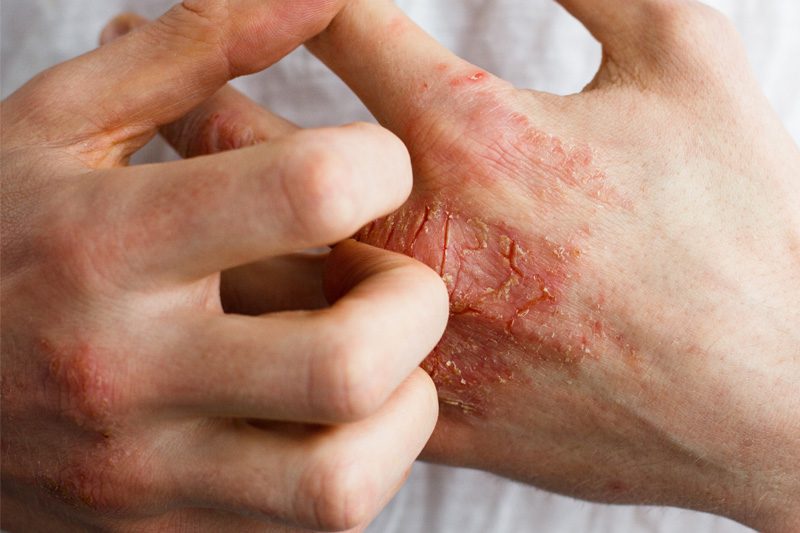By Hong Tran
2023 UBC PharmD Candidate
Eczema — also referred to as atopic dermatitis — is a chronic inflammatory disorder of the skin. It usually appears in childhood, as early as a few weeks of age, and affects 5-20% of children worldwide. In babies, eczema commonly appears on the cheeks and face as dry, raw skin. In children, eczema is more typically in the folds of elbows and knees, appearing as scaly patches of skin that may be discoloured or thickened. Adults with eczema will have skin that is very dry, more often on the hands.
People with eczema have an impaired skin barrier. This allows water to be lost, leading to dry, itchy patches of skin. Scratching the skin causes a rash to appear. Other symptoms may include redness, thickened skin, discolouration, and broken skin. Eczema may go away as one ages, flare up occasionally, or persist into adulthood. Managing these symptoms is important, as they can also result in pain or discomfort and sleep disturbances, as well as a psychological impact.
There is no single cause of eczema; rather, multiple factors can contribute, including exposure to irritants, family history, and an individual’s own immune system. Recognizing and avoiding one’s own triggers, such as allergens (like detergents) and stress, can help control eczema.
Eczema symptoms can range from mild, which may require no medication, to severe, for which medications will likely be needed to maintain control. While there is no cure, there are ways to relieve the symptoms of dry skin and itchiness.
Managing Eczema
Moisturizing is an integral part of eczema management to prevent flare-ups and control symptoms. Choosing a moisturizer that works well AND feels good on your skin will encourage regular use. Ointments, such as white petroleum jelly, are highly effective, though they are thick and can feel greasy. Creams do not hold in moisture as well as ointments do, but they are more cosmetically acceptable. Lotions are easy to rub in and absorb quickly.
Specific ingredients in moisturizers can provide an added benefit, such as ceramides to strengthen the skin barrier, colloidal oatmeal to soothe irritated skin, and niacinamide (vitamin B3) to reduce redness. Humectants like hyaluronic acid, glycerin, and urea draw in moisture. Virgin (cold-pressed) coconut oil has antibiotic and anti-inflammatory properties, in addition to helping to moisturize. Many products will contain a combination of these ingredients, so you may need to try a few different products to find one that meets your needs.
Here are a few key points to help choose a moisturizer and manage eczema symptoms:
- Select a moisturizer that does not contain perfumes or irritants, as these can worsen symptoms.
- For the face, use a moisturizer that does not block pores, especially during puberty.
- Apply moisturizer after applying any topical eczema medication.
- Avoid scratching the area, which may irritate the skin.
- Take short, lukewarm showers or baths and moisturize after bathing.
- Apply moisturizers liberally at least once a day and as frequently as several times a day.
We have a variety of unscented products in store and can help you find the moisturizer that works best for you.
